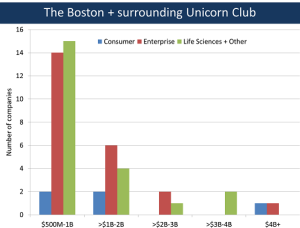Last week, I used Aileen Lee's excellent TechCrunch article on Unicorns as a jumping off point to analyze the role of the MBA in creating these unusually valuable companies. This week, I want to take a local lens and analyze these special companies that have been created in Boston. As was the case last week, I was ably assisted by HBS 2nd year MBA student Juan Leung Li.
In order to have a reasonable population of companies to assess, we tweaked Aileen's definition. We looked at the companies in New England (call them "Boston and surrounding") that had exited in the last 10 years (2003-2013) with greater than $500 million in market valuation. Some of these companies had been around for a few years, but we felt this slice would allow us to assess companies that had recently created extraordinary value in a relatively short period of time. In the case of M&A situations, we value the company at the time of the M&A. In the case of public companies, we valued the companies at the market close of 11/15/13.
We found 50 such companies (updated from 43 originally). That is, 50 companies in the Boston and surrounding area that had achieved > $500 million in value during the last ten years. 19 of these had achieved > $1 billion in value (Aileen's cut off, although she had constrained the founding date to the last ten years rather than the exit date, which obviously yields a broader population). A chart showing these 20 companies can be seen here:
A few interesting observations about the full set of 50 companies:
- Lack of Massive Winners. The perception that Boston has not recently generated massive wins appears to be only somewhat accurate, depending on which sector you focus on. Of the 19 companies that were > $1 billion in value, seven were greater than $2 billion (TripAdvisor, athenahealth, IPG Photonics, Alnylam Pharma, Starent, Boston Biomedical, Acme Packet). That said, only three of these companies are software technology companies – TripAdvisor ($12.5B), athenahealth ($5.0B) and Starent ($2.8B) – and they were founded in 2000, 1997 and 2000, respectively. In other words, there have been no multi-billion dollar valued tech companies founded in Boston in the last 13 years. There are three companies that have achieved >$1 billion in value in the tech sector founded in the last 10 years: Demandware ($1.9B/2004), Kayak ($1.8B/2004) and Fleetmatics ($1.4B/2004), although the latter was founded in Dublin.
- Essential Role of Immigrants. Here was a statistic that blew me away: over half of these companies (51%) had an immigrant founder. In my research related to my Senate testimony on immigration reform, I noted that 40% of Fortune 500 companies had an immigrant founder. Apparently, successful Boston-based startups have an even greater concentration of immigrant influence.
- Strong Diversity. The breadth of the Unicorns is impressive, reinforcing the view that Boston's startup ecosystem is one of the most diverse in the world. Of the 50 companies that achieved > $500M in value, 23 were life sciences (plus materials science), 22 enterprise technology and 5 consumer technology. To see the companies in their various segments laid out, see the chart below:
Much of this data refutes the belief that all the major startup winners have been created in Silicon Valley. In fact, the vibrant life science sector is now arguably more heavily concentrated in Boston than in any other cluster at any other time in history. That said, Boston has definitely come up short in the race to build massively valuable tech companies. And if you want to build a consumer Internet company, there are few role models.
However, I am quite optimistic about the future. As evidenced by this review of the Boston startup ecosystem, the quality and robustness of the environment has improved greatly in the last few years. As for big winners, the pipeline looks pretty good. Globoforce and Care.com have filed to go public and companies like Acquia, Actifio, DataXu, Dyn, Hubspot and Wayfair and are all reputed to be on a similar path in the next year or two.
If you want to see the entire spreadsheet with the underlying data, you can click here.
Related articles








